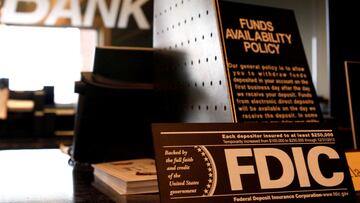Can your bank close your account? This is what you should do if it happens
It may surprise you to know that your bank can close your account without notice. While inconvenient, your money is safe and there are remedies.

It may surprise you to know that your financial institution can close the account you have with them without notice at any time. There are a handful of reasons for this happening, but the bank must return any funds that you have deposited.
While the financial institution doesn’t have to give you any warning beforehand, the bank is required to send you a notification detailing the reason for the account closure after it has happened. While it may cause you unwanted headaches to get the matter sorted, you will want to take action as soon as you become aware of this occurring.
Why your bank might close your account
There are a number of reasons why a financial institution may close your account. And while they are required to return any remaining funds, they may hold onto them for a period to ensure that any fees or charges to the account can be covered.
Below are some reasons why banks close accounts without notice.
Lack of activity:
This could be the case if you have multiple accounts and you’ve let one lie untouched for an extended period of time. Generally, there needs to be anywhere between three and five years of inactivity, no checks written nor debit transactions made, before the bank closes the account.
Below minimum or zero balances:
Banks may require you to maintain a minimum balance in your account, failing to do so could trigger an account closure. Likewise, even if you are not required to keep a minimum amount of money in the account but the balance is zero the financial institution may close the account.
Multiple overdrafts and negative balances:
Even if you have overdraft protection, consistently having your account go into the red may cause your bank to close your account. Without overdraft protection, you may begin to rack up fees when you overdraw on your account and failure to pay off the negative balance and fees could prompt the bank to shut down your account.
Suspicious activity and excessive transfer volumes:
Some banks may limit the number of transfers that you can make between accounts on a monthly basis, exceeding that may trigger an account closure. Financial institutions also keep track of your spending habits to protect you from fraud and them from people laundering money through the bank.
Accounts being flagged for suspicious activity have more than doubled in less than a decade. Your ability to perform transactions may be put on hold until the problem is resolved.
This is what you should do if your bank closes your account
In the event that your account has been put on hold, and you have payments being made from the account or are receiving funds to the account via direct deposit, you may need to reroute those transactions until the issue is solved to avoid incurring any fees or penalties.
As mentioned, any remaining funds, minus money owed for outstanding fees and payments, in the account are still yours and must be returned to you. You will need to contact your bank to get the details behind why your account was closed and sort out the balance.
If the balance amount is negative you will need to negotiate how to settle the difference. If you have a positive balance remaining you can ask how you will receive the funds remaining or should you desire to maintain the closed account, see if it can be reopened. If that is not a possibility, you can look into opening a new account at the same financial institution before taking your money elsewhere.
In the event that your account was closed due to inactivity and the bank was unable to locate you to return the money directly, the funds will be tuned over to the state for safe keeping until claimed. You will need to contact the state’s unclaimed property office where you will have to verify your identity. The FDIC provides a list but cannot guarantee its accuracy due to the links available continually being updated. The agency advises to contact the specific state where your account was closed.






